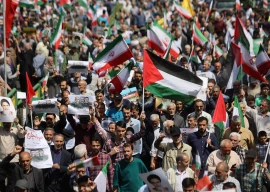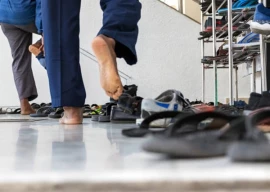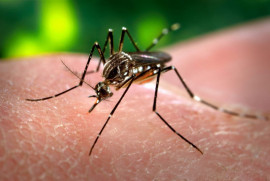
ISLAMABAD: Though help reaches out to those affected by the ongoing military operation in North Waziristan from all quarters of the country, there is a large chunk of the Internally Displaced Persons (IDPs) that still craves for attention — as women in these camps continue to suffer without anyone raising a voice for them.
Maryam Bibi, chief executive of Khwendo Kor—an NGO working in K-P— believes that the misery the flood-affected go through can be seen and noticed. However, it is the misery of these women who have been forced to leave their houses due to the ongoing military operation in North Waziristan that goes unnoticed.
Bibi, who recently visited the Bannu IDP camp, was of the view that people living in areas near Bannu too were unaware of the miseries these women were going through.
“They have lost their confidence; they are confused about the current situation. They are still scared of militants and cannot express their views about the ongoing military operation in their areas,” she said at an event organised by Women’s Action Forum to mark the organisation’s founding day.
Expressing her concerns, Bibi said the hygiene conditions were at their worst for women living with their children. Supporting her claim she cited a story of an IDP who has moved to Bannu and is now forced to live in a small barn with buffaloes and dung everywhere.
She further highlighted that majority of the young women in the camps faced sexual harassment, which is forcing their families to either sell them or marry them off to elder men.
“They are becoming victim of early child marriage and their family members are just selling them for a meager amount or marrying them off to elderly men,” Bibi said.
She added that due to the strict norms of the region women were reluctant to avail the available healthcare services. “They aren’t even ready to hold up their naqaabs while consulting female doctors in fear of their male members disapproving the act”.
Chairperson of another NGO—working for the same cause— Gulalai Ismail, said these people were more than just IDPs. “It is crucial to understand the disaster from an identity and gender perspective to reach out to women and listen to their silent suffering,” she urged, adding that, “women who are displaced have limited access to reproductive health care and are more vulnerable to domestic abuse, harassment and are being traumatised”.
Talking on the occasion, Senior Women Action Forum (WAF) member Nasreen Azhar said that poverty was the root cause behind all these issues faced by women in Pakistan.
Published in The Express Tribune, September 24th, 2014.


































































COMMENTS
Comments are moderated and generally will be posted if they are on-topic and not abusive.
For more information, please see our Comments FAQ